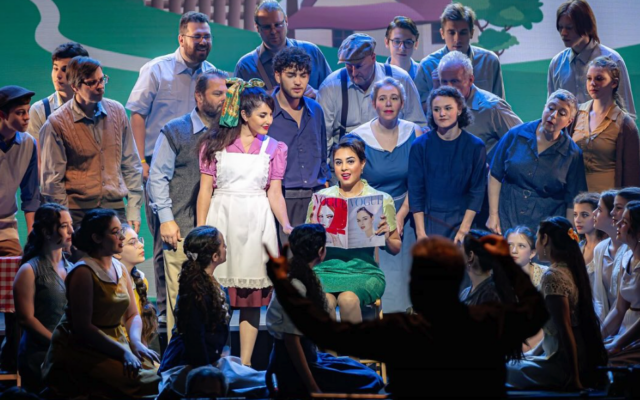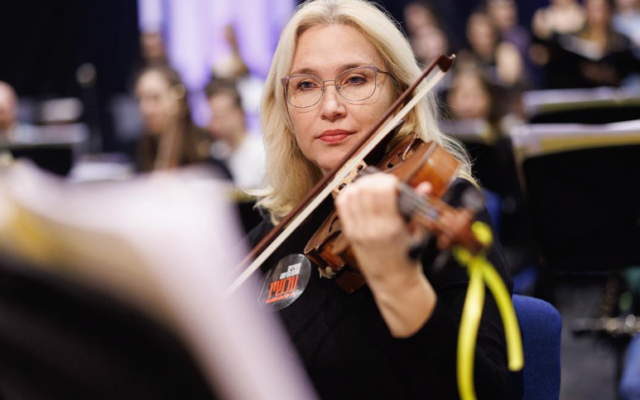Yoel Levi’s Concerts Lift Israel’s Spirits
Concerts by the Haifa Symphony and the Israel Philharmonic help to recharge a nation in a long and difficult war.

While the war in Gaza has brought significant changes to daily life in Israel, what has not changed, according to the famed conductor, Yoel Levi, is the national love of music. Levi, who maintains his home in Atlanta, has had two extended stays there in recent months. He has conducted both the Haifa Symphony and the Israel Philharmonic in performances that he says have been well-received and well attended.
“Music in Israel has been one of the most important tools to lift the spirit of the people in every war that Israel has fought,” Levi points out. “For Israelis to go to a concert means that life goes on, with an appreciation for the joy that life can bring. And music is one of the most important parts of life in Israel. And it’s just wonderful to see how many people are coming to the concerts.”
Immediately following the October attacks, the Israeli government, fearing rocket attacks, particularly from Hezbollah in Lebanon, restricted large gatherings. But by late December those restrictions were relaxed.
Levi, who is the principal conductor and artistic advisor of the Haifa Symphony, returned to the city in northern Israel to open the orchestra’s season with a stirring Beethoven program. Levi was joined by soloist Oksana Shabchenko for Beethoven’s Piano Concerto No. 5, “The Emperor,” which has strong heroic overtones and a militaristic flavor. The work was completed in 1809 in Vienna, while the city was under attack by Napoleon’s armies.

As part of the same performance, Levi conducted Beethoven’s well known “5th Symphony,” which is also known as a symphony of fate or destiny. It’s famous four note motif, introduced early in the work, is often interpreted to be fate knocking at the door. Like the piano concerto, it was written around the same time as the Napoleonic siege of Vienna.
But to launch his first concert after the tragedies of Oct. 7, he chose a slow and stately rendering of Israel’s national anthem, “Hatikvah,” and Samuel Barber’s somber, “Adagio for Strings,” which is often described as music for mourning. In America, it was played at President Franklin Roosevelt’s funeral and after President John F. Kennedy’s assassination. It’s a piece of music that reflects what Levi sees as Israel’s current mood.
“There’s no question people are down. The mood is very dark, very depressed. On the other hand, the concerts created a safe haven for people to come and recharge their spirits. And that was wonderful to see how appreciative, how warm they were for what we were doing. Still, the psychological cost of this war is very high. Very high.”

But there have been lighter moments in his busy conduction schedule in Israel. In late January, he returned to Haifa to conduct a well-received modern dress staging of Donizetti’s lighthearted comic opera, “L’Elisir d’Amore,” about the power of a mystical love potion to inspire romance.
To finish up over two months of making music in Israel, Levi conducted a series of concerts with the Israel Philharmonic. More than 14,000 attended more than a week of performances in Tel Aviv, Herzliya, and Jerusalem with the orchestra.
In one of the highlights of the series, Levi returned to the theme of love as a force in the universe, with the Israeli premiere of Avner Dorman’s, “Dialogues of Love,” a choral symphony. Dorman, who was born in the Jewish state, says the work “aims to answer many of the basic philosophical and scientific questions that we all have: What is love? What is happiness? Why do objects fall? When was the universe created?”
It’s based, in part, on the dialogues written by the medieval Jewish poet, Judah Leonie Abravanel, who went into exile in Italy after the Spanish Inquisition. It was one of the most popular books of the Italian Renaissance. Dorman expanded on Abravanel’s themes and settings by including excerpts from works from the 11th, 14th, and 18th centuries.
The extended tour and the warm response by so many Israeli concert goers proved to be deeply satisfying for Levi, who has two sisters who live in Israel and many cousins scattered around the country. But Levi said, the experience was not an easy one.
“One Friday, after I finished a concert in Tel Aviv, I went to the museum area there. A big, entire square was dedicated to the hostages. There is a long table with a chair for each hostage and their picture. I wanted to be there even for a few moments, to see and to understand the sadness of it all. How in a few hours the lives of so many people were altered in a most negative, brutal way.”



comments